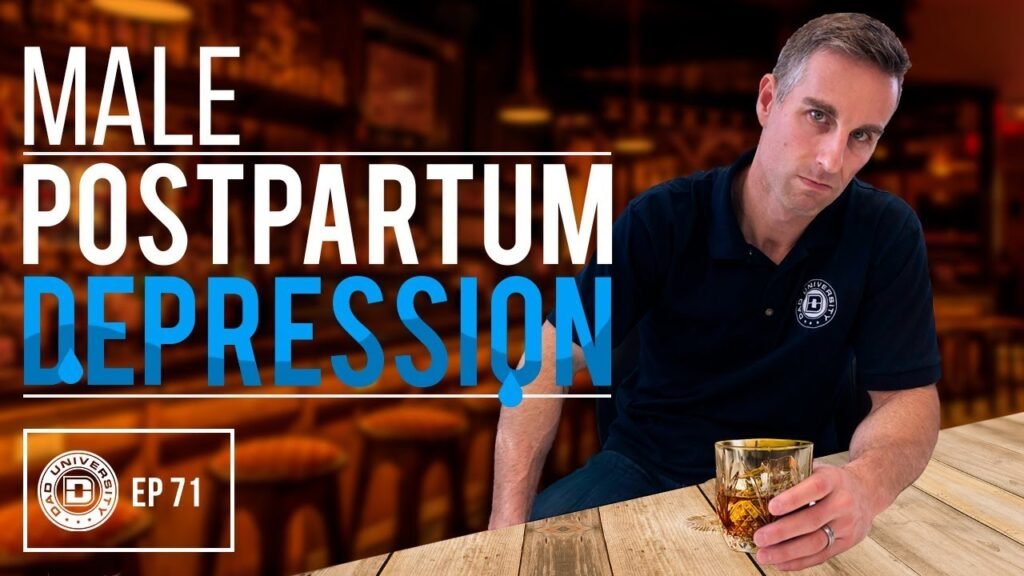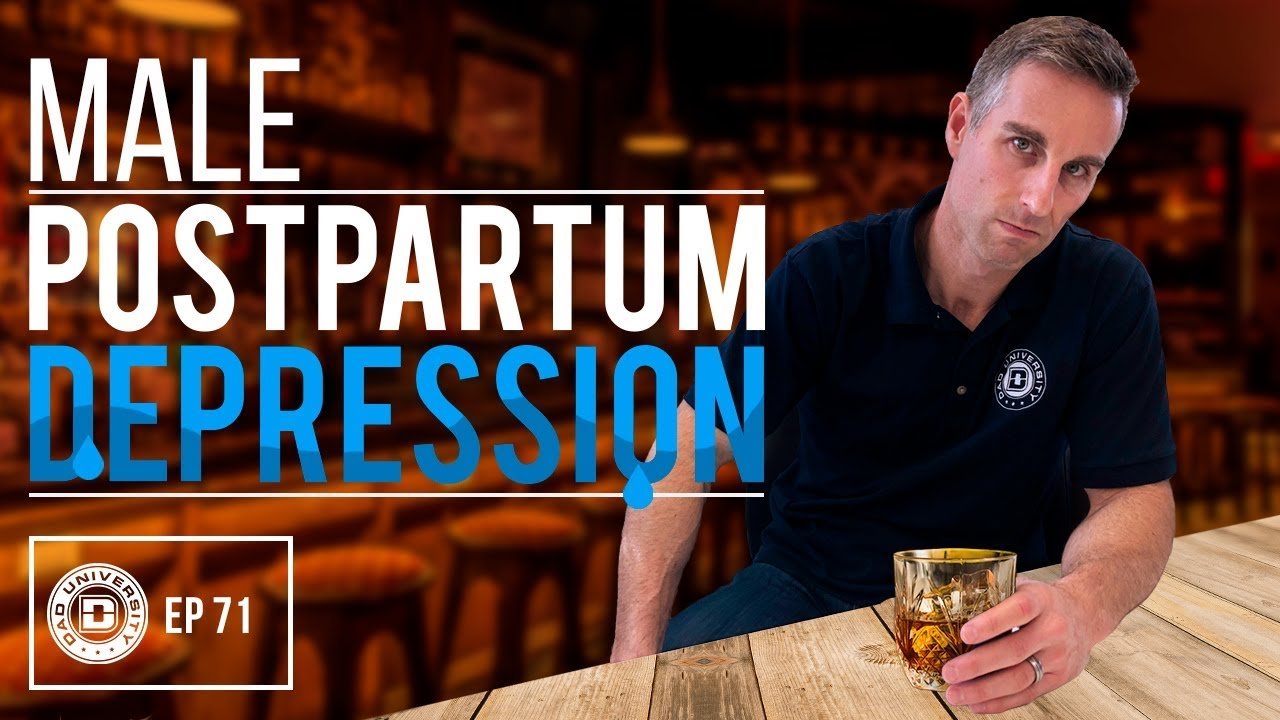As a new father, you may have experienced feelings of excitement and joy during your partner’s pregnancy and the birth of your child. However, you may have also noticed a shift in your mood, feeling down or even depressed. Male postpartum depression, also known as paternal postpartum depression, is a real issue that many men face but are often hesitant to discuss. In this video, Jason addresses the risk factors and signs of male postpartum depression, offering tips on how to overcome it.
It’s crucial to recognize that experiencing postpartum depression does not make you weak or less of a father. By taking care of yourself and seeking help when needed, you can navigate through this challenging time and be the best parent you can be for your child. From prioritizing sleep to filling your mind with positivity, there are steps you can take to overcome male postpartum depression. Remember, you are not alone in this journey, and seeking support is a crucial part of your healing process.

Understanding Male Postpartum Depression
Male postpartum depression, also known as paternal postpartum depression or paternal postnatal depression, is a serious condition that affects many new fathers. It refers to the feelings of sadness, hopelessness, and despair experienced by men after the birth of their child. While most people are familiar with postpartum depression in women, men are also at risk. According to the Journal of the American Medical Association, nearly 1 in 4 men show signs of depression 3-6 months after their baby is born.
Definition of Male Postpartum Depression
Male postpartum depression is characterized by feelings of sadness, hopelessness, irritability, and loss of interest in activities that were once enjoyed. These symptoms can significantly impact a new father’s mental health and well-being.
Prevalence of Male Postpartum Depression
Studies have shown that 10 percent of men worldwide experience signs of depression during their wife’s pregnancy or shortly after the baby is born. The number increases to 25 percent within 3-6 months after the baby is born, highlighting the prevalence of male postpartum depression.
Risk Factors for Male Postpartum Depression
Several risk factors contribute to the development of male postpartum depression. Lack of sleep, financial stress, relationship problems, history of depression, excessive alcohol consumption, smoking, and poor diet are among the common risk factors that increase the likelihood of experiencing postpartum depression.
Signs and Symptoms of Male Postpartum Depression
Recognizing the signs and symptoms of male postpartum depression is crucial for seeking help and support. Some common signs include:
Feeling Sad or Hopeless
New fathers experiencing postpartum depression may feel overwhelmed with sadness, hopelessness, or despair, making it challenging to enjoy daily activities.
Anger and Irritability
Men with postpartum depression may exhibit increased irritability, anger, or frustration, even over minor issues.
Loss of Interest in Activities
A loss of interest in previously enjoyed activities, hobbies, or social gatherings can be a key indicator of male postpartum depression.
Changes in Weight
Significant changes in weight, either gain or loss, without any apparent reason can signal underlying mental health issues.
Fatigue and Lack of Energy
Constant fatigue, low energy levels, and difficulty performing daily tasks are common symptoms of male postpartum depression.
Thoughts of Death or Suicide
In severe cases, new fathers experiencing postpartum depression may have persistent thoughts of death, suicide, or self-harm.
Tips for Overcoming Male Postpartum Depression
Overcoming male postpartum depression requires proactive steps and a combination of strategies to improve mental health and well-being. Some helpful tips include:
Prioritize Sleep
Making sleep a priority, despite the challenges of caring for a newborn, is crucial in managing postpartum depression. Identifying and eliminating time-wasting activities can free up more time for rest.
Eat a Healthy Diet
Nutrition plays a significant role in mental health. Avoiding junk food and consuming nutritious meals can positively impact mood and overall well-being.
Reduce or Stop Alcohol Consumption
Alcohol is a depressant that can worsen symptoms of depression. By reducing or eliminating alcohol consumption, new fathers can experience improved physical and emotional well-being.
Fill Your Mind with Positive Messages
Consume uplifting content such as motivational speeches, podcasts, or videos to counteract negativity and promote a positive mindset.
Practice Gratitude
Engage in daily gratitude practices, such as keeping a gratitude journal or using a gratitude app, to shift focus towards positivity and appreciation.
Seek Support from Family and Friends
Lean on loved ones for emotional support and understanding. Join local or online support groups to connect with others who may be experiencing similar challenges.
Professional Help
Don’t hesitate to seek professional help from therapists or psychologists if needed. Getting professional support can provide effective strategies for coping with male postpartum depression.
Prioritizing Sleep
Ensuring an adequate amount of sleep is essential for overall mental health, especially for new fathers experiencing postpartum depression. Despite the challenges of caring for a newborn, making sleep a priority can significantly improve mood and cognitive function.
Making Sleep a Priority Despite Challenges
New fathers can prioritize sleep by creating a conducive sleep environment, establishing a bedtime routine, and sharing nighttime duties with their partner to ensure adequate rest.
Identifying Time-Wasting Activities to Prioritize Rest
Identifying and eliminating time-wasting activities, such as excessive screen time or unnecessary chores, can create more time for rest and relaxation, ultimately promoting better sleep and mental well-being.
Healthy Diet
Consuming a nutritious diet plays a crucial role in managing male postpartum depression. Proper nutrition can positively impact mood, energy levels, and overall mental health.
Impact of Nutrition on Mental Health
Nutrient-dense foods rich in vitamins, minerals, and antioxidants can support brain function and emotional well-being, reducing the risk of depression and other mental health issues.
Avoiding Junk Food and Focusing on Nutritious Meals
Limiting the consumption of processed foods, sugary snacks, and high-fat meals can prevent spikes in blood sugar levels and promote stable energy levels and improved mood.
Alcohol Consumption
Understanding the effects of alcohol on mental health is essential for new fathers dealing with postpartum depression. Alcohol consumption can exacerbate symptoms of depression and should be minimized or eliminated.
Understanding the Depressive Effects of Alcohol
Alcohol is a depressant that can impair cognitive function, worsen mood disorders, and contribute to feelings of anxiety and depression.
Benefits of Reducing or Stopping Alcohol Consumption for Mental Health
By reducing or stopping alcohol consumption, new fathers can experience improved physical health, better sleep quality, enhanced emotional well-being, and reduced symptoms of depression.
Positive Mindset
Maintaining a positive mindset is key in overcoming male postpartum depression. Surrounding oneself with uplifting and motivational content can shift perspective and promote mental well-being.
Benefits of Consuming Uplifting Content
Listening to motivational speeches, podcasts, or videos that inspire and encourage positive thinking can counteract negativity and improve mood and outlook on life.
Strategies for Surrounding Oneself with Positivity
Creating a supportive and positive environment, engaging in activities that bring joy and fulfillment, and practicing self-care can help cultivate a positive mindset and resilience against depression.
Gratitude Practice
Incorporating a gratitude practice into daily life can significantly impact mental health and well-being, especially for new fathers experiencing postpartum depression.
Implementing a Gratitude Journal or App
Keeping a gratitude journal, jotting down things to be thankful for, or using a gratitude app can help shift focus from negative thoughts to positive experiences and emotions.
Consistent Practice of Gratitude for Improved Mental Well-Being
Regularly expressing gratitude, acknowledging blessings, and practicing mindfulness can enhance emotional resilience, promote a sense of happiness, and reduce symptoms of depression.
Seeking Support
Seeking support from loved ones, friends, or professional resources is essential in managing male postpartum depression. Connection and understanding can provide comfort, guidance, and encouragement during challenging times.
Importance of Leaning on Family and Friends
Opening up to family and friends about struggles with postpartum depression can foster understanding, empathy, and emotional support, creating a sense of community and belonging.
Utilizing Local or Online Support Groups for Guidance
Joining local support groups, attending therapy sessions, or participating in online forums can provide valuable insights, coping strategies, and encouragement from others facing similar challenges.
Conclusion
Male postpartum depression is a serious condition that requires attention and proactive steps to overcome. By recognizing the signs, implementing strategies such as prioritizing sleep, maintaining a healthy diet, reducing alcohol consumption, fostering a positive mindset, practicing gratitude, seeking support, and considering professional help, new fathers can effectively manage and overcome postpartum depression for the benefit of themselves and their families. Remember, it’s okay to ask for help and take action towards better mental health and well-being.

